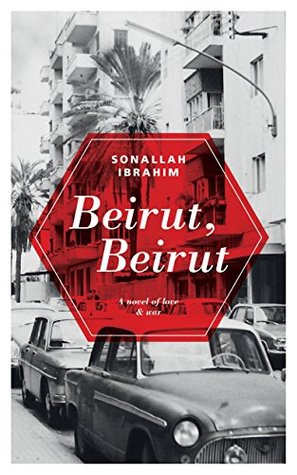"Beirut, Beirut" by Sonallah Ibrahim
 A fascinating novel which blurs the lines between fiction and journalism. Set in late 1980, the divisions of the brutal Lebanese Civil War are still in effect. Beirut is divided into East and West and depending on who you are or where your allegiance lies, one part of the city is most certainly off limits.
A fascinating novel which blurs the lines between fiction and journalism. Set in late 1980, the divisions of the brutal Lebanese Civil War are still in effect. Beirut is divided into East and West and depending on who you are or where your allegiance lies, one part of the city is most certainly off limits.
Into this post-war nightmare comes an Egyptian novelist who is seeking publication for his new novel, an experimental novel which lambasts just about every Arab regime there ever was. There’s also a lot of graphic sex. The narrator has no illusions about the publication of his novel but due to a prior connection he holds on to a thread of hope that it will indeed be published. Meanwhile, he navigates the treacherous divisions which have now split the city in two. We’re not sure of the narrator’s political allegiances, nor his religion for that matter (which does matter to many of the political players running each portion of the city); he drinks, smokes and has a raging libido. There are two women who enter the fray — an independent filmmaker named Antoinette, who hires him to write the voice over for her latest film about the Lebanese Civil War, and Lamia, the beautiful employee of the publishing house who has shown interest in his book. The narrator takes on the job of writing the voice over with relish and it is here where the novel begins to blur the lines between fiction and journalism. A good portion of the novel is a play by play of the images in Antoinette’s film, which describes in explicit detail the ravages of the civl war — it’s political alliances, it’s sometimes blurry lines of who is with who and who is against who, the wheeling and dealing between politicians both home and abroad, the role of the United States in the affair, the massacres committed by all sides, the bitter religious differences, and the eventual sectarian division of a once open and cosmopolitan city. Meanwhile, his own friends can’t be trusted and his relationship with Lamia is contentious at best, with Lamia being more liberated, albeit selfish and independent, whose allegiance is more to herself than to any group or faction.
What makes this novel the powerful one that it is is the journalistic detail of what went on during this bloody civil war and the absolute savagery of it; how all the different sides vying for power and control were willing to disregard human life as if it were merely an obstacle toward that goal. In essence, no one is innocent and through all this sectarian and political mindlessness, what’s universal is love and desire and the yearning to make sense of one’s life. Highly Recommended
Translated by Chip Rossetti
 1
1



